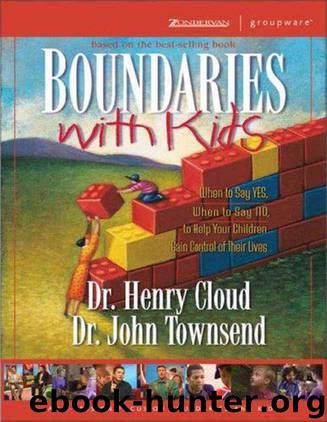Boundaries with Kids by Henry Cloud; John Townsend

Author:Henry Cloud; John Townsend
Language: eng
Format: mobi
Published: 2012-01-03T16:45:09+00:00
-8-
Life Beyond “Because I'm the Mommy”
The Law of Motivation
On a father-son outing recently, I (Dr. Townsend) overheard a conversation between two dads that became a learning experience for me.
“I'm really having problems with Randy's attitude lately,” said the first dad. “He'll take out the trash or do his homework after I tell him to, but he gripes and grumbles a lot about it. His motives aren't right.”
There was a silence. Then the second dad replied: “Ed, sorry, but you need someone else's shoulder to cry on. My Mack has yet to find the trash can.”
Two different dads, two different issues. One kid had crummy motives and attitudes. The other wasn't up to this problem yet. At first blush, you may be wondering what motivation has to do with helping your child develop boundaries. This is especially true if you are in the second dad's situation. Many of you are struggling with out-of-control, defiant, passively withdrawn, or argumentative and manipulative kids. You're not looking for good motives. You're trying to find a way to get your children to mind you and become more responsible. Motive seems a long way away. “Let me get this kid under control,” you plead, “then I'll worry about helping him with his motivation.” Motives drive our behaviors. They are the internal “because” behind the external actions we perform. As the Bible teaches, out of our hearts proceed all sorts of wicked deeds (Mark 7:20- 23). If the behavior is the problem, it gets the attention. If you have a fire in your living room, you're more concerned about putting it out than where it came from. But wait! Two very important issues revolve around the question of motives. First, once you have your child's attention, motives will become crucial. A child will clean her room because she won't get a movie that weekend unless she does. But when that same child turns twenty, she will need other reasons for keeping her place neat.
Motives, as we will see, develop in stages in a child's character. Immature motives, such as fear of pain and consequences, help young children. But parenting involves more than helping a child develop ownership over her behavior. You want your child to do the right things for the right reasons, not simply to avoid punishment. She needs to learn to be a loving person (see 1 Timothy 1:5).
Suppose you want your son to do his homework. He gets up from the table several times, dawdles, and finds ways to avoid it. You stand over him, nagging him until he finishes. You may win the skirmish, but you have lost the war. Your son's motive for finishing his homework is to get you off his back, not so he will get a decent grade. What do you suppose will happen tomorrow night if you leave his side? So many parents are stuck in this dilemma. They can rant, rave, and threaten, and the kids will stay in line as long as the parents are standing over them.
Download
This site does not store any files on its server. We only index and link to content provided by other sites. Please contact the content providers to delete copyright contents if any and email us, we'll remove relevant links or contents immediately.
| Early Childhood | Parenting Boys |
| Parenting Girls | School-Age Children |
| Single Parents | Teenagers |
The Lost Art of Listening by Michael P. Nichols(7506)
Rich Dad Poor Dad by Robert T. Kiyosaki(6633)
We Need to Talk by Celeste Headlee(5615)
I Love You But I Don't Trust You by Mira Kirshenbaum(3876)
The Complete Idiot's Guide to Coping With Difficult People by Arlene Uhl(3149)
Rich Dad Poor Dad: What The Rich Teach Their Kids About Money - That The Poor And Middle Class Do Not! by Robert T. Kiyosaki(2958)
A Burst of Light by Audre Lorde(2607)
The Book You Wish Your Parents Had Read (and Your Children Will Be Glad That You Did) by Philippa Perry(2528)
Dealing with People You Can't Stand by Dr. Rick Brinkman(2460)
Life Hacks by Dan Marshall(2456)
An Odyssey by Daniel Mendelsohn(2309)
The Expectant Father by Armin A. Brott & Jennifer Ash(2273)
Teach Your Child How to Think by Edward De Bono(2159)
No Time to Say Goodbye(2118)
What I Need by J. Daniels(2082)
The 7 Habits Of Highly Effective Teens by Covey Sean(2080)
The Out-of-Sync Child by Carol Stock Kranowitz(2054)
The Anxious Generation by Jonathan Haidt(2051)
I Don't Belong to You by Keke Palmer(2005)
